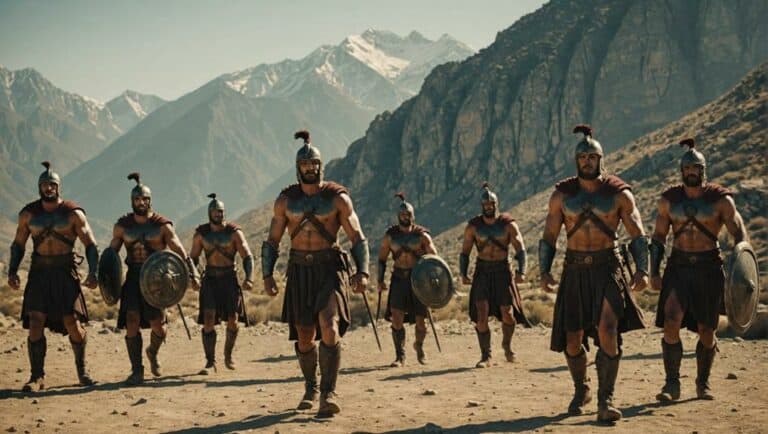Unveil the Spartan warriors' brutal training regime that forged them into ultimate fighters. Starting from their rigorous childhood evaluations to the intense Agoge system.
Discover how discipline, endurance, and teamwork built a legacy that still influences modern military strategies and warfare tactics.
Early Childhood Evaluation
From the moment Spartan boys were born, their potential as future warriors was rigorously evaluated. In ancient Greek society, particularly in Sparta, this evaluation was a pivotal first step in determining a child's future. Spartan boys underwent a thorough physical examination shortly after birth. This process was designed to identify those who were deemed strong and healthy enough to eventually endure the rigors of Spartan life.
The criteria for this evaluation were stringent. Any signs of weakness or deformity often resulted in the child being rejected by the state. This harsh practice ensured that only the fittest survived, aligning with Sparta's militaristic values. The evaluation wasn't merely about physical strength; it also assessed the child's overall health and potential for growth into a robust warrior.
As part of this early assessment, the community played a significant role. Elders and experienced warriors conducted the evaluations, applying their seasoned judgment to predict the boy's future capabilities. This early scrutiny was essential in maintaining the high standards of Spartan warriors.
State-Controlled Upbringing
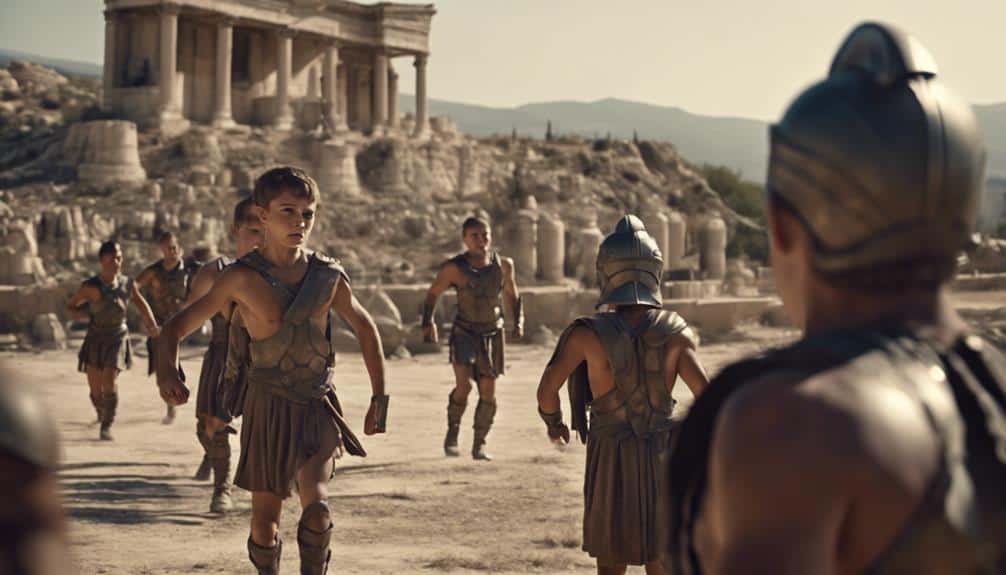
At the age of seven, Spartan boys were taken from their families and subjected to a state-controlled upbringing designed to mold them into elite warriors. This Spartan training began with a thorough evaluation shortly after birth and a clear shift into state care by age seven. The state-controlled upbringing was meticulous, ensuring each boy received basic Greek education while undergoing regular inspections to maintain discipline and readiness.
Boys were immersed in a rigorous schedule that included foot races, wrestling, and intense team contests. They were fed a meager diet, intentionally keeping them slim and hungry, which taught them resourcefulness and resilience. The practice of punishing boys for stealing food and encouraging participation in the annual ritual of cheese-stealing further toughened them both mentally and physically.
The state's relentless focus on physical training and discipline created a culture where loyalty to Spartan society was paramount. The goal was to produce ultimate warriors who weren't only physically capable but also mentally prepared to endure the harsh realities of battle. This state-controlled upbringing was fundamental in fostering a sense of unwavering dedication to Sparta, ensuring the city-state's military might and societal cohesion.
Rigorous Physical Training
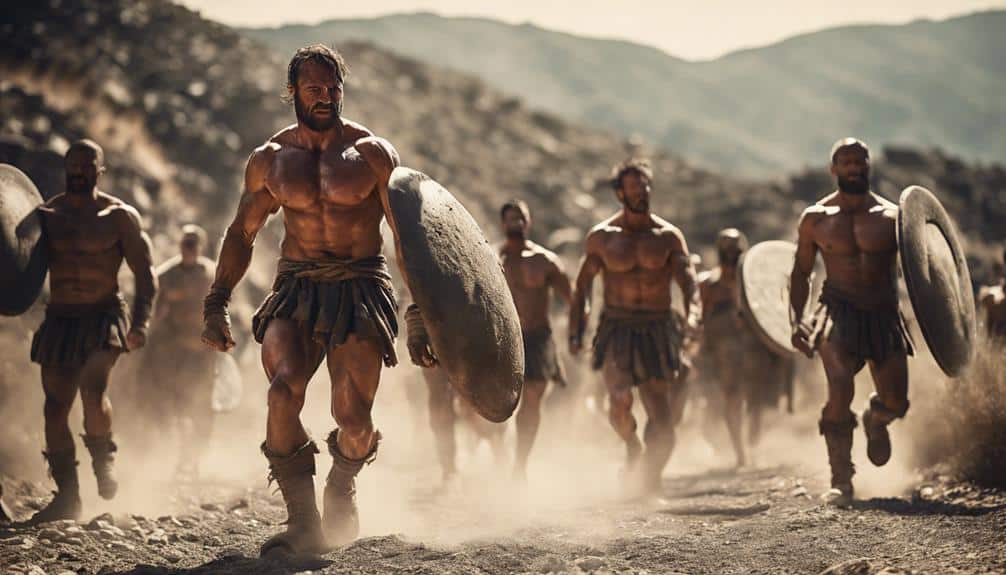
Spartan boys' rigorous physical training, commencing at age seven, was meticulously crafted to build endurance, agility, and combat skills essential for surviving the harsh demands of Spartan warfare. This early initiation into a demanding regimen ensured that each boy developed the necessary attributes to become a formidable warrior.
The training encompassed various intense activities aimed at improving physical fitness and competitiveness. These included:
- Team Contests: Boys engaged in rigorous team contests that fostered strength and a competitive spirit.
- Foot Races: These races enhanced their speed and endurance, vital for battlefield agility.
- Wrestling: Wrestling bouts developed their raw physical power and tactical skills in close combat.
Spartan boys were subjected to a meager diet, intentionally designed to keep them lean and disciplined. They were often punished if caught stealing food, although the act itself was seen as a test of cunning and resourcefulness. Annual rituals, such as the stealing of cheeses, further tested their stealth and ability to operate under pressure.
Through this relentless training, Spartan boys learned discipline, teamwork, and physical fitness. These elements combined to mold them into some of history's most formidable warriors.
Agoge System
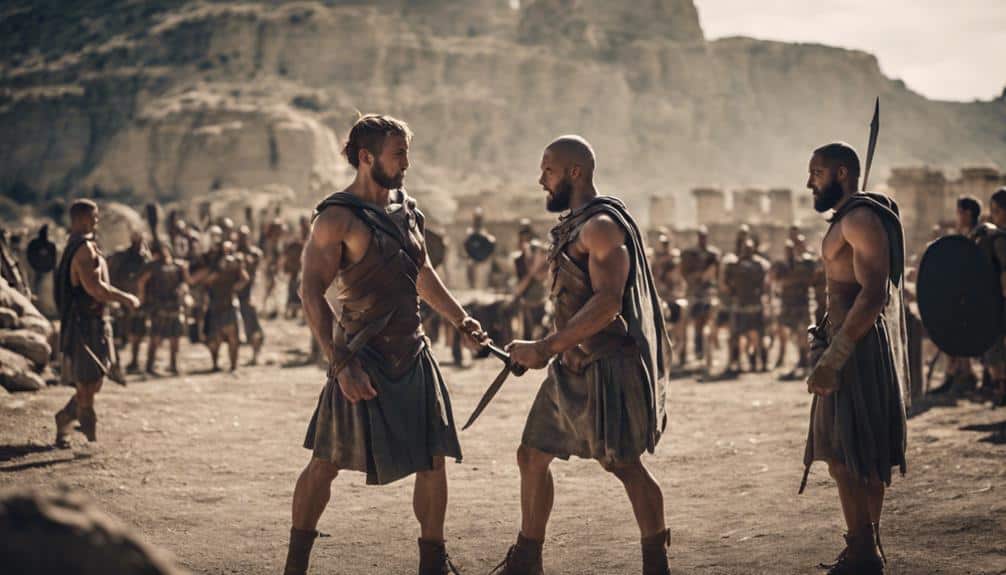
In the Agoge system, boys progressed through age-based training stages designed to instill core virtues like discipline, loyalty, and fearlessness.
You'll find that each stage intensified physical and combat training while also emphasizing survival skills.
This systematic approach guaranteed that every Spartan warrior was rigorously prepared for the challenges of battle.
Age-Based Training Stages
Breaking down the Agoge system reveals a meticulously structured training regimen that categorizes young Spartans into distinct age groups: paides (boys), paidiskoi (youth), and hēbōntes (men).
Each stage of the Agoge system focused on unique aspects of rigorous training and military preparation to create formidable warriors.
Paides (Boys): Starting as early as age seven, boys entered the paides stage. Here, they engaged in a broad curriculum emphasizing sports and physical conditioning. They participated in running, wrestling, and other athletic activities designed to build their strength and agility.
Paidiskoi (Youth): Upon reaching their teenage years, young men progressed into the paidiskoi stage, where the training intensified. This phase concentrated on honing combat skills and endurance. The emphasis was on preparing for battle through relentless drills, weapon training, and survival exercises.
Hēbōntes (Men): In their late teens and early twenties, Spartans entered the hēbōntes stage, focusing on tactical maneuvers and battlefield strategies. This level of training was designed to refine their capacity to lead and execute complex military operations.
Through these age-based stages, the Agoge system guaranteed that every Spartan was groomed for the demands of military life, embodying unparalleled discipline and strength.
Core Virtues Instilled
Through the Agoge system, Spartan warriors internalized core virtues such as strength, endurance, and solidarity, which were pivotal in shaping their identity and effectiveness in battle. The Agoge was more than just a training program; it was an immersive experience that began in childhood and continued into adulthood. You'd find that this system meticulously fostered physical prowess and unwavering loyalty among its participants.
Strength and endurance weren't cultivated solely through traditional combat exercises. Spartan warriors engaged in gymnastic competitions and dancing, which emphasized agility and discipline. This multifaceted approach ensured they weren't just strong but also incredibly agile and coordinated—key attributes in the chaos of battle.
Solidarity was another cornerstone of the Agoge system. From a young age, Spartans were conditioned to prioritize the needs of their community above individual desires. This sense of unity was reinforced through shared hardships and collective training experiences. The bonds formed during these formative years created a cohesive unit capable of executing complex maneuvers with precision.
Even Aristotle praised the effectiveness of Spartan training, highlighting their unique methods. The Agoge system's rigorous and all-encompassing nature was instrumental in producing some of history's most formidable warriors, embodying the virtues that defined Spartan society.
Team Competitions
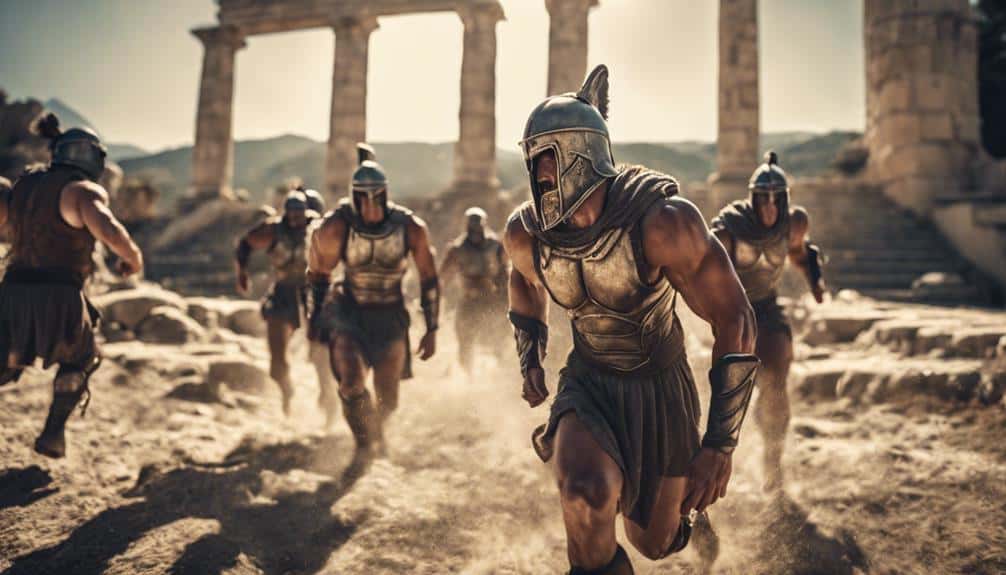
Spartan boys' participation in demanding team competitions, like group wrestling matches and collaborative foot races, was designed to build camaraderie and test both their physical and mental resilience. These team competitions were a vital part of the Spartan training regime, fostering a spirit of unity and teamwork. By engaging in these contests, boys learned to rely on each other, which was pivotal for their future roles in the Spartan army.
In these activities, the competitive nature of the team events was instrumental in instilling a sense of cohesion among the trainees. This process helped develop not just individual skills but also an understanding of collective effort.
- Group Wrestling Matches: These matches required strength and strategy, teaching boys to coordinate their efforts and trust each other's capabilities.
- Collaborative Foot Races: These races emphasized speed and endurance, necessitating seamless cooperation to achieve a common goal.
- Team Challenges: Various other team-based exercises reinforced the importance of working together under pressure.
Military Skills Development
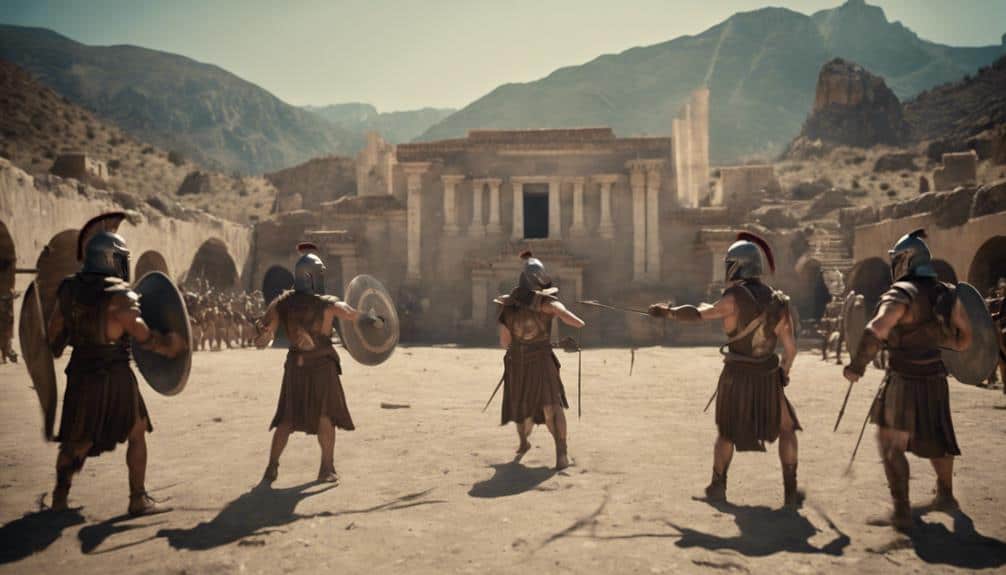
To develop the necessary military skills, the training regime meticulously focused on enhancing physical fitness, agility, and tactical prowess among the young trainees. Spartan soldiers were subjected to a variety of exercises designed to build these attributes.
Foot races, for instance, were a staple, not just for speed but for endurance and the ability to maneuver swiftly during combat. These races weren't casual jogs; they were brutal contests that tested the limits of the trainees.
Combat techniques were another crucial aspect. Young Spartans learned to wrestle with an intensity that mirrored real battle scenarios. Wrestling wasn't merely a sport but a method to instill strength, technique, and the mental fortitude needed to overpower an opponent. The emphasis on strategic thinking was evident in these exercises, as soldiers had to outmaneuver their adversaries using both brawn and brain.
Teamwork was equally essential. Intense team contests required soldiers to work seamlessly as a unit, fostering discipline and loyalty. This was vital, as the Spartan phalanx relied on each soldier's unwavering commitment to hold the line.
Through this rigorous training, Spartans developed the discipline, courage, and loyalty that defined them as ultimate warriors.
Challenges of Spartan Tactics
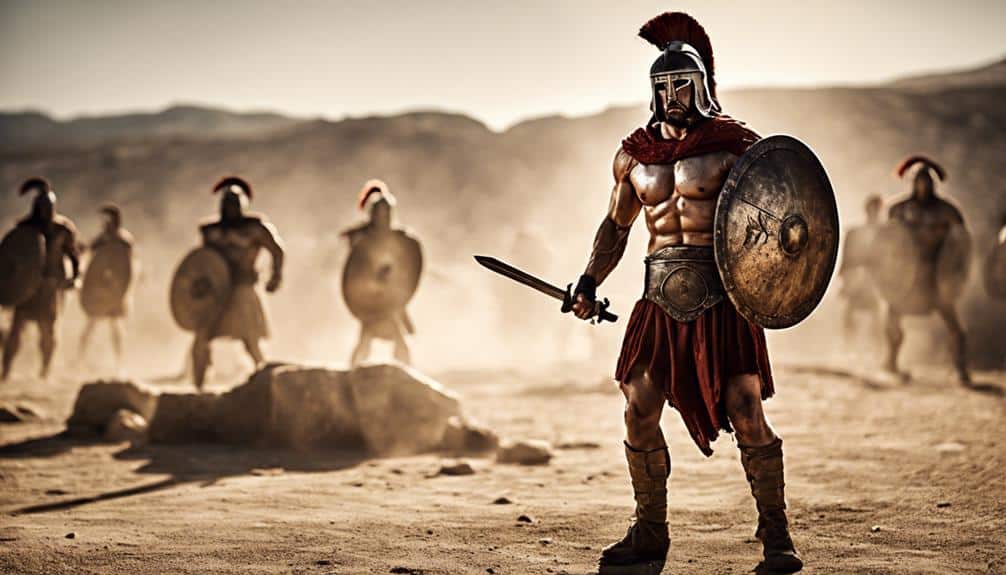
Despite their renowned prowess, Spartan tactics faced significant challenges due to their rigid adherence to the phalanx formation, which severely limited their maneuverability on the battlefield. The phalanx, a dense, tightly-packed infantry formation, was effective in straightforward confrontations but struggled in more dynamic and varied tactical maneuvers required in evolving warfare scenarios.
The rigidity of Spartan tactics became evident in several key areas:
- Adapting to Terrain: The phalanx formation was less effective in rough or uneven terrain, common around many Greek cities, where flexibility was essential.
- Facing Cavalry: Spartan soldiers found it difficult to counter cavalry units, which were becoming more prevalent and effective in Greek warfare.
- Innovation Stagnation: The Spartan military system's reluctance to innovate left them vulnerable to more adaptive enemies, as seen in their defeat at the Battle of Leuctra against Thebes.
This adherence to a singular tactical approach prevented Spartans from effectively countering new threats.
Their conceptual lock on the phalanx formation hindered their ability to evolve alongside changing social and political landscapes. Consequently, their military dominance waned as they failed to incorporate more flexible and adaptive strategies into their arsenal.
Women's Role in Training
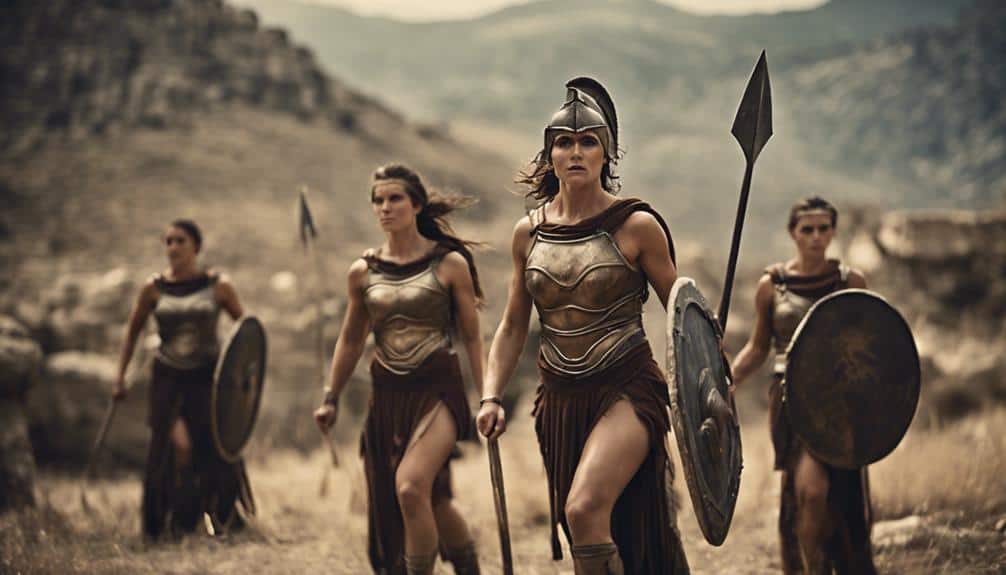
While the limitations of Spartan tactics posed considerable challenges on the battlefield, the rigorous training and upbringing of Spartan women played a central role in sustaining their warrior culture. Spartan women were encouraged to be physically fit and strong, engaging in activities like javelin throwing and wrestling. These exercises weren't just for leisure; they were crafted to ensure that women could bear strong and resilient offspring, vital for maintaining Sparta's military might.
Spartan women didn't just train physically; they managed the village and imparted practical skills to the young. They guaranteed the upbringing of strong Spartan warriors by teaching essential survival skills and instilling a sense of discipline. Their influence extended beyond physical training.
Singing and dancing were also integral parts of their education, enhancing their overall abilities and cultural contributions. The role of Spartan women in society was profound. They shaped the values and characteristics of future warriors, embedding the principles of strength, endurance, and resilience.
Through their direct involvement in both training and upbringing, Spartan women participated in a particularly brutal contest of societal expectations, contributing significantly to Sparta's enduring military prowess and cultural identity.
Legacy of Spartan Warriors
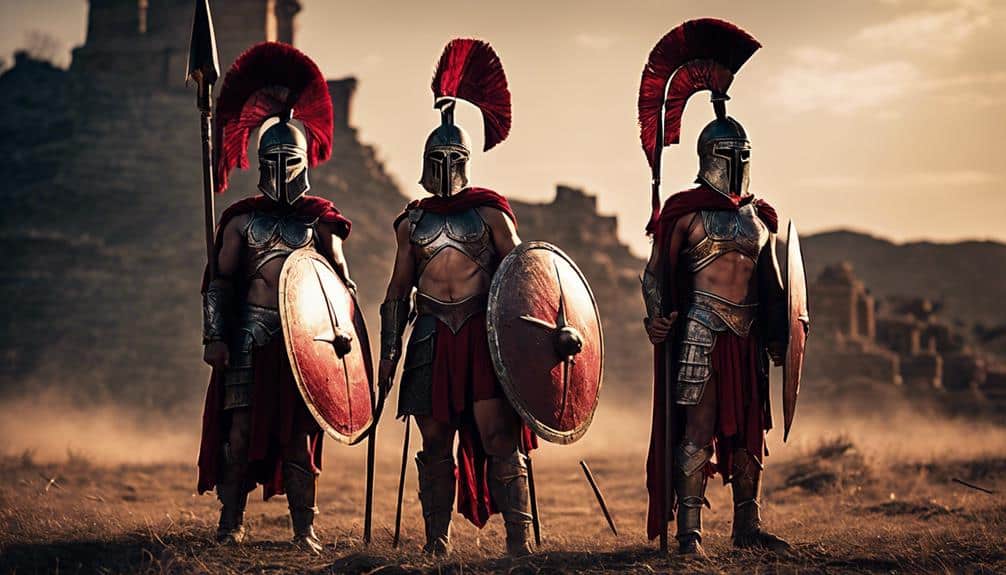
When you consider the legacy of Spartan warriors, you'll find their unmatched combat prowess and enduring military influence impossible to ignore.
Their rigorous training and societal structure, heavily supported by Spartan women, created fighters who were pivotal in shaping Greek history.
These factors collectively guaranteed that Spartans maintained their independence and forged powerful alliances.
Unmatched Combat Prowess
The Spartan warriors' unmatched combat prowess stemmed from a lifetime of rigorous training under the Agoge system, which meticulously honed their physical and mental capabilities to create elite soldiers. From a young age, Spartans were immersed in a demanding regimen designed to build physical endurance, mental toughness, and tactical acumen. Their training wasn't just about brute strength; it was a holistic approach to creating the ultimate warrior.
Key elements of their training included:
- Fighting to the Death: Spartans were conditioned to never retreat and always fight to the death. This instilled an unyielding bravery and absolute commitment to their state, making them formidable adversaries.
- Brutal Contests: To foster competitiveness and camaraderie, Spartans engaged in brutal contests such as foot races, boxing, and pankration—a no-holds-barred fighting style. These contests tested their limits and prepared them for the harsh realities of battle.
- Team Competitions: Intense team competitions were a staple in the Agoge system. These exercises not only built individual skills but also emphasized the importance of unit cohesion and strategic thinking.
Enduring Military Influence
Spartans' enduring military influence is evident in their strategic alliances with the Romans during pivotal conflicts like the Punic and Macedonian Wars, showcasing their impact on military history. These alliances highlight the respect and value placed on Spartan warriors, even by powerful civilizations like Rome. Spartans managed to remain independent from Alexander the Great's Empire, further underscoring their strong military reputation and strategic acumen.
In ancient history, Spartan warriors were renowned for their discipline and order, making them the most formidable military force in Greece. Their combat prowess wasn't just about brute strength; it was also about strategic brilliance and unwavering dedication to their state. This legacy of disciplined, methodical warfare tactics has transcended time, influencing modern military training and strategies.
Spartans restored Humanity's heroic history through their fearless battles, embodying the virtues of courage and loyalty. Their brutal training regime, known as the agoge, produced warriors whose influence is still felt today. Military academies and special forces worldwide draw inspiration from Spartan methods, emphasizing rigorous training and absolute discipline. This timeless effectiveness secures the Spartans' place as a pivotal force in ancient history and modern military thought.
Spartan Women's Role
While Spartan warriors dominated the battlefield, it was the strong and disciplined women of Sparta who secured the perpetuation of their legacy. In Ancient Greece, Spartan women were encouraged to be physically fit and strong, engaging in activities like javelin throwing, wrestling, singing, and dancing. These pursuits weren't just for personal benefit but were important in raising robust future warriors.
Spartan women played a pivotal role in managing the village, ensuring its success and strength. They imparted practical skills and values that were necessary for the cohesion and resilience of Spartan society. Their involvement in physical activities directly influenced the discipline and prowess of Spartan soldiers.
Here's how Spartan women contributed notably:
- Physical Training: They maintained excellent physical fitness, which was essential in nurturing strong offspring.
- Village Management: They managed day-to-day affairs, providing stability and structure.
- Cultural Values: They instilled values of courage, steadfastness, and discipline, fostering a resilient community.


